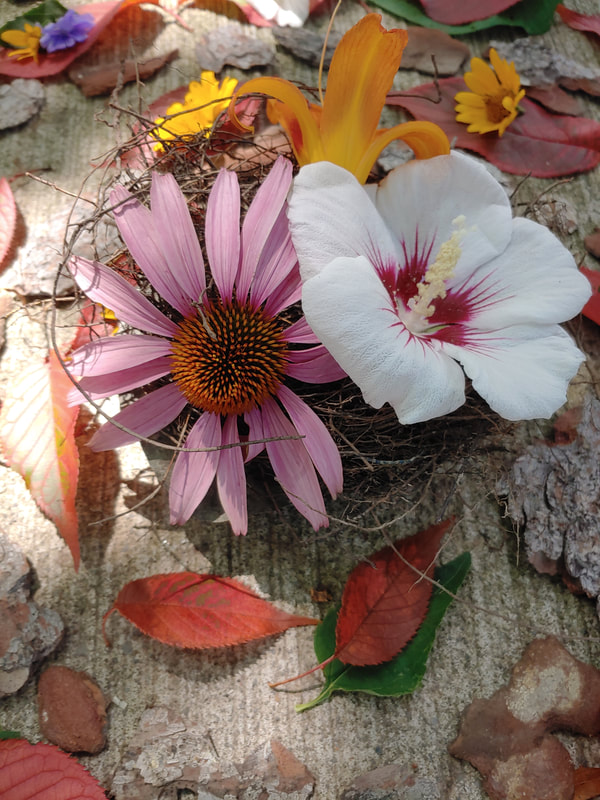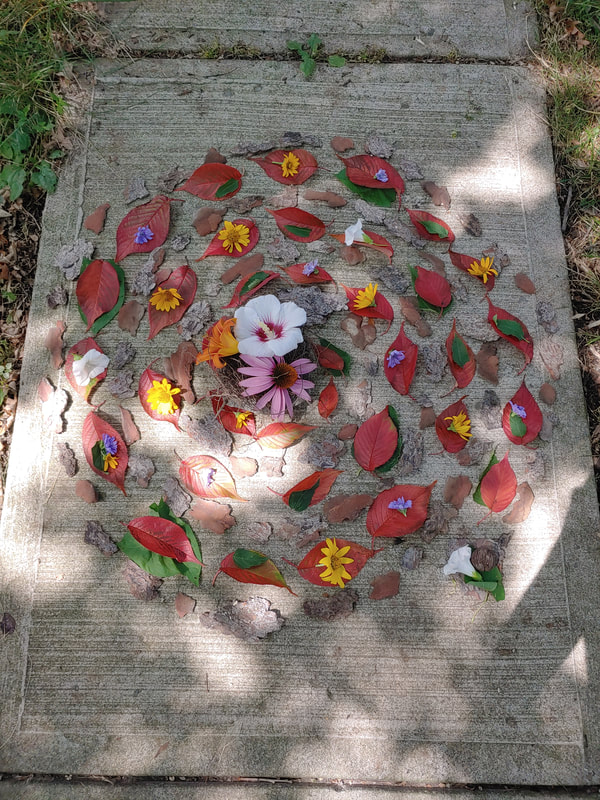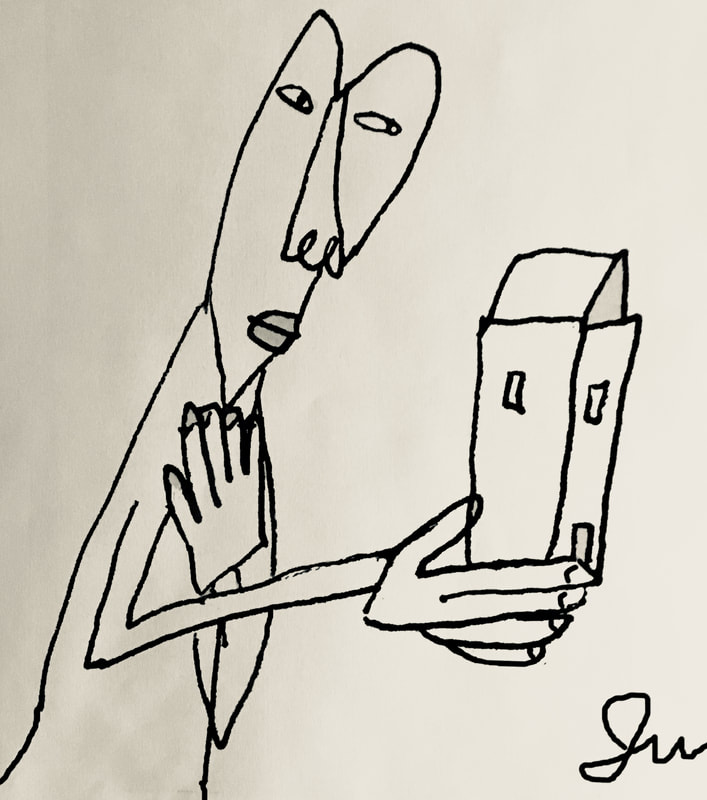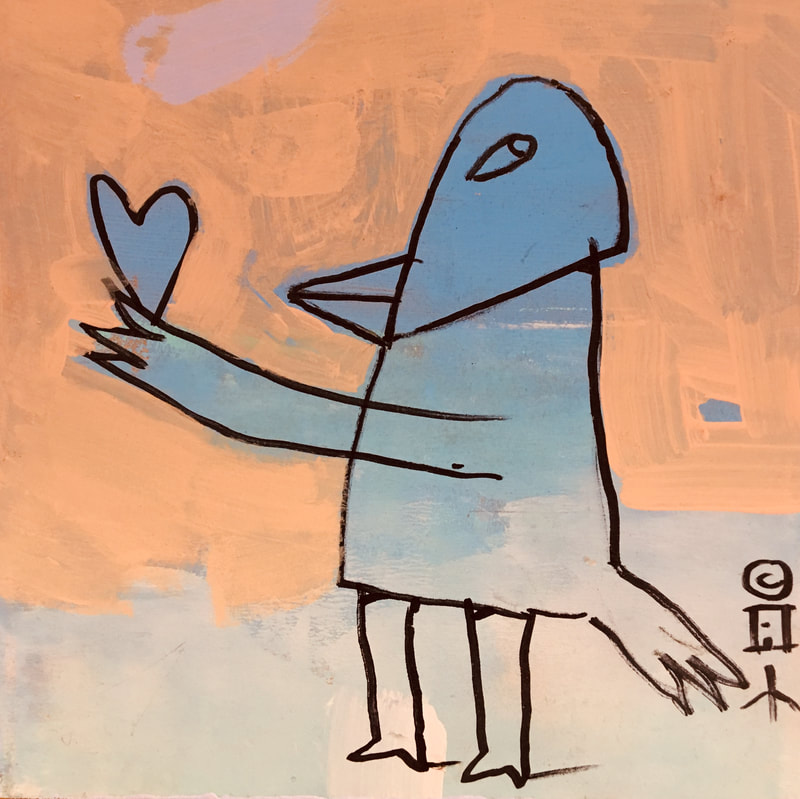 No, but can anything halt a running rumination, never mind dissolve it? I maintain that a good breath plus a good question has potent reset power. I’ll give you three footholds to this here:
In a hurry? Skip to #3 and grab some potentially arresting questions for next time the mind tries to run away with you. 1. A story I recently went to the coast of Maine for the love of sea and summer and the place itself. It’s so lovely to breathe that clean air full of salt—and consciously breathing is my favorite reset. One day, I got into a muddy line of rumination. You know when you throw a whole relationship into question? That. Reality: sunshine and blue sky. My mental space: a dank, festering atmosphere for some putrid specimen to grow unimpeded and keep spawning hands to palpate for problems. (Yeah, yuck.) Standing outside to feel my feet on the earth (I was going for grounding to move out of my head), I heard a bird call I couldn’t identify. From grounding, the simple act of connecting to one of my senses brought me more fully back to presence. That’s when I took a breath that I actually paid attention to (coming closer to presence still), and I reached for a question. Let me add that I was already aware of the line of thinking that kept reasserting itself, and I had already consciously noted some wise stuff. (It hadn’t fully taken yet, but I don’t consider that a problem; I trust the process.) These things I knew:
Nailed it. I felt an immediate and pure release. This could be a good daily question to ask the self about anyone close, and it’s especially brilliant for a romantic/primary partner. Because you already know this, don’t you? You actually don’t need anything from anybody. The best work of unsticking from what you think you need from another (certainly the beloved) really happens between you and you, and you can leave them out of it. They don’t need to show up in any way (except however they do) for you to keep letting go of wanting to control them or of expecting them to make you comfortable. (Um, and rumination doesn’t help.) The question reset me and I had a great day from there (peninsula, beach, lobster) and felt love and joy with the human being in question. The pure truth of needing nothing from another in order to be well, happy, safe, in love—anything—came in so fully for me that my mind didn’t even try to pick the rumination back up. Now, you know the mind will typically try. In my case, on that day, it had robotically picked up a small set of repeating thoughts for at least an hour with factory-set arms of steel. I just don’t let this sort of thing move in for the day, so note that I was already in my process. Most important, I hadn’t been believing those thoughts. I had been witnessing them and telling myself truer things. So this probably set me up to be more open to the power of the question. It’s a useful thing to practice, that not believing your own thoughts. A good question, even if it doesn’t just dissolve the whole thing, can throw a wrench in the works of a rumination on auto-pilot. The question creates an opening, or a sense of possibility that you could actually let it go. That’s pretty amazing in itself. You can best expand that sense of possibility through presence—not with further thinking. 2. An important distinction It helps to clearly make this distinction: yes, you can meet challenging mental stuff through clear thinking processes of inquiry or contemplation; rumination is not that! When you give full focus to straightening out your thinking in a time you’ve designated for that—perhaps with a clear helper or a tool like The Work of Byron Katie—that’s a productive, helpful way to meet the mind. Rumination just hijacks your thinking. Rumination means mindless mental chewing as you do other things. It’s no good. It robs you of presence, expands whatever anxiety or emotion matches the content, compounds confusion, and further furrows the brow. Want to play more with presence? It’s not hard. Keep coming back to the breath, and use grounding and checking in with your senses to connect to here and now. It takes rumination-thwarting focus to keep coming back to now, to what the moment is feeding you through the body and its senses. You might call it hard, but it’s not. It’s a practice, and it’s worth repeating (while the repeating thoughts that take over if you don’t do this are truly of no use to you). 3. Some questions There are so many good questions to ask yourself. Just reach for it. Try out a few (without necessarily answering them), just to see how they hit you. You’ll know in your body when you’ve got one worth keeping in view for a minute. The right question may need no answering either: the truth it points to is self-evident.
That last one can actually be fun. I call it the Here and Now game. It allows you to get curious about or fascinated by where you were in time (years away, sometimes!) and what place you were in beyond your current physical location (an ocean away, perhaps). It’s a playful way to call yourself back to the moment, your actual reality. Take a conscious breath and ask, How far away did I just go in time and space? Could be all you need to foil the rumination. Love & blessings, Jaya Go back to another post on Rumination Relief.
0 Comments
Below are categories of positive rumination, with examples. Scan them, if you wish, and come closer to the ones you’re most drawn to or need the most help with. Use all of these categories with an intention of self-soothing. Notice that you actually know how to soothe yourself and you’re able to soothe yourself.
DO NOT make feeling better a requirement for sticking with self-soothing. Do it for its own sake. Do it because it’s more likely to eventually calm you and make you hopeful and clear and able to act--while going back to negative ruminations or self-attack is likely to make you feel worse and get stuck where you don’t want to be. Cultivate kind, self-supporting rumination for the sake of not abandoning yourself. Do it as practice. Do it to be kind; to vote for life, healing, evolution; to come closer to love. Connecting to magic: Notice signs and symbols; review synchronicity, echoes, repetition. Let yourself be wowed by the gorgeous timing or aligned meetings you didn’t orchestrate. Make much of how life keeps surprising you. Revel in the wonder of super-cool stuff and creatures and facts—amazing stuff is actually REAL on this planet. Let the beauty of it all touch you. Laugh at absurd happenings and interconnections. Be fascinated and amazed by how the parts of your life and people in it are woven together by an intelligence greater than you—an intelligence that’s interesting and loving and has a fabulous sense of humor. Trusting in or experimenting with a friendly Universe: This is a human experience, not something personal. I’m willing to be a human being having this human experience. This is not punishment—I don’t live in a punitive Universe. I don’t need to understand why this is happening; I need to get present and meet it well. I can believe I’m guided and have all the support I need. I can watch for all that’s revealed along the way and trust the journey. I can believe I [anyone, a group, the planet] will gain from going through this. Lemonade-making (subset of friendly U above): [First one’s from Byron Katie:] I’ve been spared. Whatever or whoever falls away no longer belongs in my life to support my current level of healing and evolution. There will be lessons in this I can’t see yet; perhaps I can name one now—some likely or obvious one. Nothing is going wrong here (besides that I’m not getting what I wanted when and how I wanted it). This is a great opportunity to practice what I’ve been wanting to practice. I’m building some muscles right now, and muscles are appealing. This is a chance to trust life, to show up for what’s actually happening, to value open and shut doors equally as part of my ongoing guidance. This is an opportunity to draw and hold boundaries. There’s no problem with what’s happening. (Note the latter is true even if people are hurting or dying—not to deny death or suffering but to accept anything as part of human life on planet earth, and to believe in an evolutionary thrust operative even it looks like it’s going backward.) Looking for all that supports you: Start simple and get basic. I have food, water, air, a roof overhead, ground underfoot. My mattress supports me; this pillow supports me; the couch supports me. This land supports me. The beauty of this place supports me. My love of this mission supports me. I have a working phone, and there are 3 people I could text or call if I wanted to; if I left them a message they’d receive it in right time with caring. I can see one thing I could do right now that would make me feel better physically or emotionally; I can see one thing to do that would support me to feel better inhabiting my space. Certain people occupying certain roles in my life support me. I can think of one thing to try or think about differently that I want to practice and/or that has served me before. Someone kind is nearby or has been recently. Strangers have helped me or could. The unexpected could happen, and I’m open. I can remember a specific time the unexpected did happen. I’m not lacking support just because I hurt. I’m not lacking support just because I don’t know what to do or can’t see into the future. I’m not lacking support just because I’ve made mistakes or think I’m making one now. Actually, I do have all I need right now. Cultivating the belief that you’re fine as you are: There’s nothing wrong with me. Whatever I’m feeling is okay. There’s nothing to fix. Source sees me as an entirely valid and beautiful being on an entirely valid and beautiful journey. I’d like to see myself as Source sees me. I’d like to see myself through lenses of love and compassion and ease and forgiveness. I think I can get better at that; in fact, I already have. All will be revealed as I go and I’m okay right now. I’ve been here before and I didn’t get stuck here. It’s okay to be a work in progress—that’s in fact all that’s possible. It’s okay to be exactly where I am now on my path at this moment in time—and because it’s impermanent, it will yield to something else. What if there’s nothing to fault myself for? If I’m in a shame spiral or self-reproach, the thing to correct is the shame or the reproach; I don’t need to be corrected; I am not a problem. If I’m not acting right now or if I keep putting that off, maybe it’s not time for it. Maybe I’m working up to it. Maybe I’d work up to it better being kind to myself. I’m fine. Giving yourself a bit of credit: Consider and name things you’ve completed recently, things you feel good about, things you did well, things you’ve achieved, things you’ve understood more deeply, new insights or aha moments. Consider something recent you handled better than ever or interrupted or remembered earlier. I’ve come a long way. I’m doing better with this than I used to. I can think of things I’ve cleaned up or transformed that I wasn’t sure I could change or that I know human beings can go into denial about or get stuck in. I’m willing to look at myself. I’m willing to witness myself right now and to get kinder in the witnessing. What I’m feeling or believing now really better represents my younger self. You might imagine sitting with or holding that one now and giving them/her/him messages of love and reassurance; let them in on good things to come. Expanding into “I’m amazing”: I actually like myself—I like my sensibilities and my preferences and my skills and my talents. I like how I look, how I use my body, how I feel things. I love how the Universal intelligence [love] [goodness] [life force] moves through me. I can think of things I’ve done that are really cool and kind of amazing. I love what I’m cultivating and moving toward right now. I can think of things I’ve lived through that made me a strong and kind of badass human being. I like some of my current life choices and experiences and ways of being that support and express my badassery. I can think of ways I’ve loved well and truly made choices for good. I love how I’m loving now. It just keeps getting better. I keep getting better. I’m amazing. I can think of things I’ve created or been part of or led that I truly value. I appreciate my values. I can think of things I’ve learned about or learned to do that I’m kind of in awe of. I like how I feel right now. I like who I am right now. [Last one’s from Louise Hay:] I love myself, I approve of myself. Being here now: There’s nowhere else I need to be; there’s nothing else I should be doing. The Universe has got that right now and I don’t need to give it my attention. That’s their business, not mine—I release them to their life, I release myself to mine. Ah, in this exact moment, this is what I see (hear, taste, smell, feel). I don’t need to check on the future right now. I get to focus on the one task of the moment, not the outcome or other parts of the project. There’s nothing to asses or evaluate right now. If I’m stuck in something past, I’m the one holding on to it: the Universe and all of life has moved on. If someone else is stuck in a past we had together, I can leave them to it; it’s up to me to move on and cultivate my own presence here and now. I can feel the breath moving through me. Right now, I can connect to the felt, sensory experience of the breath. I feel that it feels good, it calms me, it brings me to the core of my being. The breath connects me to now and brings me to my body as it is now, as I inhabit it now. I’m willing to be here now. Going general (from Abraham-Hicks): I don’t need to figure this out right now. I’ve (we’ve) gotten through similar or worse and I’m (we’re) wiser and more equipped for this. All will be revealed in right time. I’ll know what to do in the moment. This is all human stuff and life stuff—not personal to me. This is a normal human experience to go through and I’m willing to go through it. If I don’t know, I don’t need to know right now. It’ll all come out in the wash. I can pan out to eagle view and get out of stressful mouse-view. I can leave the details aside and keep my overall vision in view. I don’t need to understand where the money will come from—things get financed and my understanding of and relationship with money can keep changing. I have time—we all have time; there’s no shortage of time. I know how to prioritize. I just need to locate the next thing to do. I can aim roughly in the right direction and trust in my ability to course-correct. I can believe I’m guided even in the midst of uncertainty. Soothing yourself could include bits from all the categories above, and if you can’t put a topic down, there’s nothing like going general (just above) to diffuse the stress of it. Mental self-soothing or self-talk that makes you feels better involves giving yourself a string of messages to remind yourself that nothing’s going wrong, that you’re equipped to meet what’s happening, that all is well, that you’re guided, that your needs are met and you’re safe, that everything and everyone are in the care of a greater intelligence than yours, that love prevails. Love & blessings, Jaya  Use what you gained to clean up your messiest stuff that won't seem to go away. I want to invite you to what you already know and show you a simple way to apply it to the thing that mystifies you—that area of life where you sometimes call yourself hopeless and you shake your head (or fist) (or entire self, mentally, like a mean cartoon parent). In this brief post, I’ll show you a quick, potent way to frame what you’ve already cleared or conquered or mastered (perhaps surprising your old self) and bring it to the stubborn spot. It literally involves making 2 lists. That's it. What's your rough spot? Money, for me, is that tricky life challenge, the thing that’s been (and continues to be) a life’s journey to bring into alignment. I’ve gotten okay with this: all human beings have something, and I’m a human being. I invite you to get okay with the thing that most throws you off, and to apply the following trick to that: relationship, sex, food, health, your body, pain, work/career, socializing, some creative pursuit or field of knowledge, emotional well-being, communication, letting go—whatever it is. What I saw, in one of those inspired flashes (you know the ones), was that the same mindsets I’d learned and consciously taught myself to hold toward food could be true for money, so I wrote down some statements that roughly express mindsets I’ve adopted with food, knowing they’d be true for money too. I made this first list seeking to consciously focus just on food (as best I could). Why food for me? This is the best point of departure for the exercise: something that was somewhat problematic earlier in life (and probably along the way, perhaps even after some major clean-up), but that you've been able to bring into alignment (perhaps some time ago, that you've likely continued to make adjustments around as you go). You’re not a newbie. Honor your own experience and wisdom gained. Consider what you’ve cleaned up, healed, gotten a handle on that used to be not so pretty or not so easy to manage. Make your equivalent list from the food list that follows, using language that feels right to you. These statements express what's real and true for me now that did not use to be:
Once I had this list, it was easy to go through it again substituting the word money anywhere the word food appeared (with small tweaks here and there, where a slightly different wording made more sense). I sought to feel each assertion again as if it were brand new—and it truly was; it was downright illuminating to imagine bringing to money the same lessons learned with food. So here we go again. But not again, really—for the first time. This is the first application of kinder, simpler thoughts of allowing and aligning, in this case with that stubborn, still problematic life challenge—money for me and, for you, whatever you know it to be:
That’s it. For me, this was profound. I took my time feeling it, and it gave me a great sense of expansiveness, relief, opening to new possibility (all of which I consider signs of alignment from my guidance system!). Do it for real with your substitutions. Do it out loud or in writing, not just in your head. Nail it. Clearly bring to view the opening to a new, wider, more beautiful, perhaps truly liberating vista. I want to close with expressing appreciation for Michael Beckwith and his teachings about radical visualizing/visioning that begins with feeling into and getting centered in some aspect of life where you feel great (connected, allowing, in the flow), then visiting your scary place while you hold that energy; and for Sarah McCrumm and her teachings about money, which opened me to the crazy idea of easy, healthy, sweet connections possible for me in that thorny realm. Love & blessings, Jaya  This is BRIEF—not because it rhymes so nicely with RELIEF, but because—springtime. So take it in like a big clearing breath, then run play outside. (Addendum: Or in the time of Corona, carry on in the best way you see to LIVE YOUR LIFE.) You know that when the mind is chewing and belching in a rambling rumination, you can't be fully present to the brilliant buzz and birdsong (or to WHATEVER'S actually going on here and now). Let's cut through the illusions that keep rumination in place:
Try these 3 steps toward getting OUT of rumination:
One more metaphor to illustrate those 3 steps: To go with gum and hamsters, let's add a dog on a leash. Notice (witness) when it goes for the disgusting random foodstuff, interrupt it at once (no need to think anything through!), and redirect—head ANY other way. (Argh, canine, was that even ever edible? Argh, mind, aren't you so disgusted with this endless review of what needs no reviewing?) May your communing with all things spring unfold in glorious presence. Love & blessings, Jaya Here's another post I made on dissolving rumination with a good breath and a good question. Heart art from the incomparable (Ithaca local!) ALiCE MuHLBACK. (Alice made my logo!)
get free of 3 painful patterns in relating Attachment, frustration, rejection: 3 simple and super-recognizable relational patterns. It’s so helpful to see how they’re operative—because, simply put, they take us away from love. Note that we all have all three patterns, with one predominant. They work together: you have to be attached to something in order to be frustrated that it’s not in place and then reject what you don’t want. Note, too, that I correlate these 3 styles to Enneagram types at the very bottom of this post! This may seem more heady than my last deeply heart-based Love Overhaul post, but I promise there’s some gorgeous wow-juice in here. I’ve laid it out with simple clarity (not saying you’re slow or thick, oh, NOT-Molasses One; I know your life is full). And this may look long, but it has lots of skimmable bullet points. I’ve illustrated each pattern below with simple “I” sentences. Scan for the phrases that resonate (uh, and maybe feel cringey). I invite you to watch first for your own relational patterns, then later consider how you’ve been on the receiving end of those of others. As you read, remember there’s nothing to judge: this is just what we human beings do. We’re just trying to get our needs met because we don’t trust that’s always happening anyway. We don’t trust that life will show us how. We don’t trust that we’ll be okay if we don’t grab the reins from others (or use more subtle tactics to manage them). So read with compassion and kindness to yourself. Attachment What could I be attached to that would keep me from purer forms of love?
Frustration How do I cultivate or demonstrate frustration, thus staving off the purer forms of love?
Rejection How many ways could I feel or wield rejection to keep myself from purer forms of love?
PAUSE. Allow an integrating breath to go fully in and fully out. You can stop here and just notice and take in the ongoing story of attachment, frustration, and rejection in human (your) relating. Or read on (or come back later) to get more clarity on moving beyond them. Countering these relational patterns I’ll give you a bunch of helpful bullet points, then I’ll give you the big, most important thing, the one thing to focus on if nothing else. (Spoiler alert: It’s about presence. Boils down to NOW.)
About NOW as the key, once again Speaking of this moment, NOW can be understood as the great solution, the foil to the relational patterns, if you’re clear on the difference between relationship and relatedness. I learned this from Jessica Dibb and Russ Hudson, two brilliant teachers of the Enneagram. Relationship is about structures, agreements, and expectations. Relatedness is about active, dynamic, live, in-the-moment relating with another. You’re relating with who they are right now as who you are right now. Once again, now is your best friend. Now contains all you need in every realm of life, and certainly to express, experience, and act upon love. (It occurs to me all human relationships are love-based—even in our professional lives, even in quick exchanges with a cashier: we’re always emitting, receiving, exchanging love.) Actual relatedness requires being present right now to what’s actually happening, what’s being said, what’s being felt. I like to think of my progeny in terms of the current version of them. There have been so many versions over the years, so I get to keep falling in love with who they are now. We can apply this to anyone, and bring it to now: the beloved before you isn’t simply a current version as in this year’s version or this era’s; this is the current version right now, in this very moment. There has been and will be no other moment like it. We support one another’s becoming and our endless potential to transcend false identity by simply allowing one another to be as we are right now and drop in for that. Drop in with curiosity, awe, amazement, the sense of what a privilege it is to witness and partake of this moment, to participate in it fully, to discover someone you love all over again, to discover yourself again in the process. Does it get any better than that? I invite you to the freest love you have access to at any given moment. Breathing consciously into presence, you can witness and shift out of attachment, frustration, and rejection. If you’d like a simple, beautiful love credo (which got more responses than anything I’ve written perhaps ever), see my post Love Overhaul. If you're Enneagram-aware, note that the attachment types are 9, 3, and 6; the frustration types are 1, 4, and 7; the rejection types are 8, 2, and 5. (Still, we all have all three, whatever our core type!) Note that each of the 3 relating triads discussed here has a representative type from each center! (Example: For attachment, 9 is the body type, 3 is the heart type, 6 is the head type.) Baffled by the order I named the types for each of the 3 styles in the first sentence of the prior paragraph? I named them in the order of the 3 centers—body types first (891), then heart (234), then head (567). That's the flow of the Enneagram. Love and blessings, Jaya |
Categories
All
|





 RSS Feed
RSS Feed